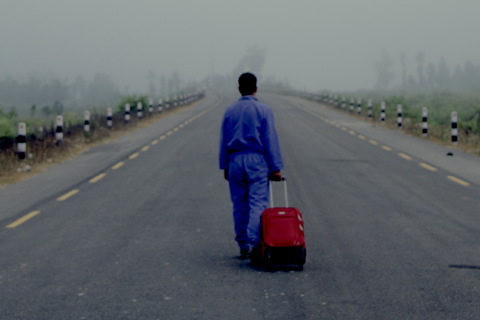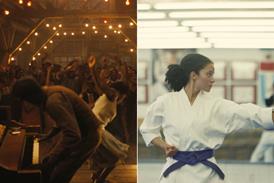Nepalese debut follows roads less travelled - both visually and in terms of its oblique narrative

Dir/scr. Fidel Devkota. Nepal/Sri Lanka. 2023. 87mins
Political protest, poetically-toned parable and an eerie streak of the supernatural make for an inconsistent but undeniably individual package in writer-director Fidel Devkota’s Nepalese drama The Red Suitcase. Included in the Mumbai Film Festival’s South Asia competition following its debut in Venice’s Orizzonti section, this atmospheric, quietly troubling piece arguably operates in too many registers at once to quite gel as either a cinematic or a political statement, but nevertheless shows uncompromising stylistic exploration. Festival slots should continue to beckon.
Uncompromising stylistic exploration
Devkota’s fiction debut follows 2016 documentary Wind Of Change In Lo Mustang, plus various shorts and extensive experience as a visual anthropologist working in the Himalayas. That experience leaves its mark on this film, with the supernatural dimension rooted very concretely in the material and the everyday – from the crisply evoked landscapes to the (arguably too mundane) central image of an ordinary red wheelie bag. Some elements, though visually striking, may not be immediately readable to international audiences – notably, a roadside slope covered in mirrors, in fact a memorial to hundreds of drivers who died in that spot. References to war in Kashmir and the driver’s memory of his teacher, executed by Marxists, also assume that viewers have some knowledge of local politics and recent history. The key point – never spelled out, but increasingly clear in the course of the film – is the fact that so many Nepalese, short of work at home, have travelled as labourers to the Gulf States, and either returned severely ill or died under dangerous, exploitative conditions.
The Red Suitcase begins with a black screen and voice-over phone call in Nepalese between a married couple. The man (Prabin Khatiwada) is a migrant worker, currently away from home, where his wife (Shristi Shresta) has given birth to a daughter. The couple’s relevance to what follows will not be apparent for some time. Meanwhile, the action proper kicks off at Kathmandu Airport, where an unnamed man (Saugat Malla) i summoned to pick up an unspecified consignment that has arrived from Qatar, mysteriously accompanied by a red suitcase, contents unknown. The driver heads off in his truck on a two-day journey to a remote mountain region through a varied landscape, sometimes barren, sometimes lushly vegetated – all the while listening to a radio phone-in on which a man tells a strange story about a seemingly ghostly encounter.
At one stop, a figure at first seen in foreboding silhouette (Bipin Karki) invites the driver to join him in his roadside tea shop where they exchange views on the state of the world and the nation, the host inveighing ruefully against the Nepalese government and its inadequate care for the poor and oppressed. This extended, melancholic sequence of chamber drama, in chiaroscuro in a mahogany-toned interior, very much feels like the heart of the film. Interspersed are enigmatic shots of a man walking along misty roads at night, himself trailing a red suitcase. When this wanderer reaches his destination, the film moves into a different register, more lyrical and more manifestly inflected by the visual language of dream or magic.
It is up to the viewer to imagine exactly what the red suitcase represents, and what it contains. At the risk of imposing a western myth on an Asian drama, it might be seen as something akin to a Pandora’s box of earthly sorrows – although a rather florid end-credits ballad spells it out more explicitly.
As the driver, Saugat Malla makes a calm, taciturn embodiment of Nepalese national conscience, while Bipin Karki as his mournful host has a melancholic, eerie presence, especially when seen seated motionless like a statue at his table. Shot with an emphasis on extended, static shots – the director’s notes flag up the influence of Ozu, Mizoguchi and Hou Hsio-hsien – the film opens up in its second strand, the walking man’s homecoming, into a contrasting vein, with DoP Sushan Prajapati using surprisingly expressionistic lighting.
Uttsav Budhatoki’s sparse score can feel excessively emotive in its use of flute and strings, but works to haunting effect played under the tea shop discussion, with pizzicatos mixed down just above the subliminal.
Production companies: Icefall Productions, Cine Sankipa, Film Council Productions
International sales: Reason 8, ak@reason8films.com
Producer: Shova Thapa, Fidel Devkota, Ram Krishna Pokharel
Cinematography: Sushan Prajapati
Editing: Saman Alvitigala
Production design: Ramlal Khadka
Music: Uttsav Budhatoki
Main cast: Saugat Malla, Prabin Khatiwada, Shristi Shresta, Bipin Karki






















